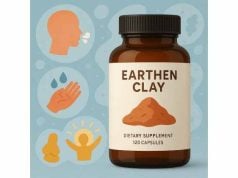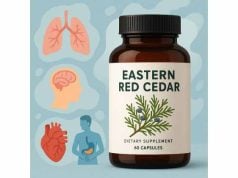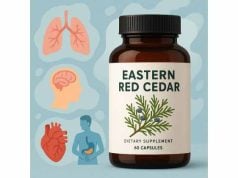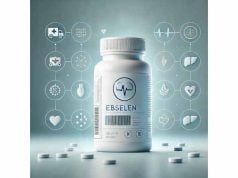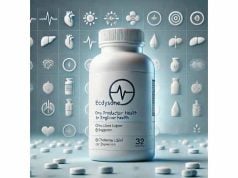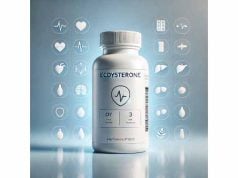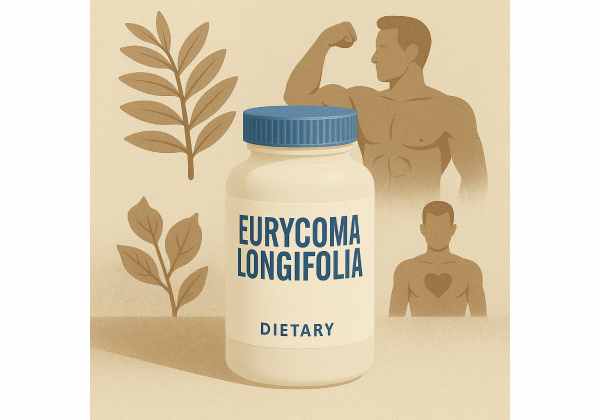
Eurycoma longifolia—better known as tongkat ali or “longjack”—is a Southeast Asian root used traditionally for vitality, libido, and stamina. Today it is marketed for healthy testosterone support, stress resilience, and exercise performance. Modern research paints a nuanced picture: standardized water extracts may modestly raise total testosterone in some men (especially those with lower baseline levels) and can improve mood under stress, yet effects on free testosterone, athletic performance, and sexual function are mixed. Quality varies widely among products, and safety assessments differ by authority. This guide distills what the evidence actually shows, who might benefit, how to use it, how to choose a reliable product, and where the risks lie—so you can make an informed, safety-first decision.
Essential Insights for Eurycoma longifolia Users
- May modestly increase total testosterone in men with low baseline levels; effects often appear within 2–12 weeks.
- Can reduce perceived stress and cortisol in some users; performance and sexual outcomes are inconsistent.
- Typical research-backed dose: 100–400 mg/day of standardized water extract (≈0.8–1.5% eurycomanone) for up to 12 weeks.
- Safety caveat: EU authorities have raised genotoxicity concerns at high exposures; rare liver injury has been reported.
- Avoid if pregnant or breastfeeding, under 18, or with hormone-sensitive cancers or active liver disease.
Table of Contents
- What is Eurycoma longifolia?
- Does it really raise testosterone?
- Other benefits backed by studies
- How to take it: dosage and timing
- Safety, side effects, and who should avoid
- How to choose a quality product
What is Eurycoma longifolia?
Eurycoma longifolia Jack is a slender tree native to Malaysia, Indonesia, and surrounding regions. The root—sold as tongkat ali or longjack—contains a family of bitter diterpenoid compounds called quassinoids, the best-studied of which is eurycomanone. Commercial supplements typically use standardized water extracts of the root, often labeled with a eurycomanone range (commonly about 0.8–1.5%) and glycosaponins. These standardizations matter because most clinical trials have used water extracts near those ranges, not raw powder or alcohol tinctures.
Why do people take it? Historically for vigor, sexuality, and “male tonic” effects. Biologically, several mechanisms have been proposed: support for gonadal hormone signaling (e.g., increased luteinizing hormone signaling to Leydig cells), modest aromatase inhibition (limiting conversion of testosterone to estrogen), and central nervous system effects linked to stress modulation. Think of tongkat ali less as a direct replacement for testosterone therapy and more as a botanical that may nudge the body toward hormonal balance—if the baseline system is suboptimal. This helps explain why studies tend to find larger benefits in men with borderline-low testosterone compared with young, healthy athletes.
It is also marketed for performance and body composition. Here the evidence is mixed: some small trials report improved strength or subjective vigor, while others show no advantage over placebo. Product quality is highly variable—analyses have found some supplements under- or over-standardized for eurycomanone, and some contain no detectable amounts of key constituents. Because efficacy and safety are closely tied to dose and composition, choosing a well-characterized product is essential.
Regulatory status differs by region. In some countries it is sold as a dietary supplement; in parts of the EU it has been evaluated as a “novel food,” with unresolved safety concerns at high exposures. There is no universal global standard for potency or purity. The bottom line: tongkat ali is a traditional root with modern interest, plausible mechanisms, and some promising human data—tempered by variability in products and ongoing safety discussions.
Does it really raise testosterone?
In short: it can—in specific contexts. A recent systematic review and meta-analysis of clinical trials concluded that standardized Eurycoma longifolia extracts significantly increased serum total testosterone in men overall, with the largest effects in those with low baseline levels. That aligns with individual randomized trials in ageing men showing dose-dependent increases in total testosterone and improvements in fatigue and quality-of-life scores over 12 weeks. These findings suggest a real biological signal rather than placebo alone.
However, the magnitude and consistency of change vary. Not every study shows an effect, especially in young, healthy or athletic populations with normal testosterone. Importantly, increases are more consistently reported for total testosterone than for free testosterone or sex-hormone-binding globulin (SHBG), which often remain unchanged. Clinically, this means some men may see lab numbers move modestly without a parallel change in symptoms—or vice versa. Time course matters, too: studies report meaningful changes after 2–12 weeks, not overnight.
How big is the effect? That depends on baseline status, dose, and extract standardization. Trials using 100–200 mg/day of a standardized water extract have shown modest yet statistically significant increases in total testosterone compared with placebo in middle-aged and older men with lower baseline levels. Pilot data at 400 mg/day in seniors also report increases, but study sizes are small and designs vary. A few trials combining tongkat ali with other botanicals reported sexual or hormonal benefits, but blends make it impossible to attribute effects to tongkat ali alone.
What does this mean for you? If you are a man with borderline-low total testosterone and compatible symptoms (fatigue, low libido), a trial of a standardized water extract may be reasonable—ideally with baseline labs and a follow-up test after 8–12 weeks. If you are already eugonadal (normal testosterone), the odds of a meaningful change are lower. Tongkat ali is not a substitute for clinically indicated testosterone therapy in hypogonadism, nor is it a “mass builder.” Expect modest effects at best, and monitor symptoms and labs rather than chasing a target number.
For women, research on testosterone outcomes is sparse. Tongkat ali’s most plausible roles for women relate to stress resilience and vitality (see the next section), but robust hormonal data are lacking. Anyone with hormone-sensitive conditions should avoid use unless a specialist gives a clear green light.
Other benefits backed by studies
Beyond testosterone, where else might tongkat ali help? Three areas have the most human data: stress and mood, sexual health, and aspects of exercise adaptation. Results are promising in places, null in others, and often limited by small sample sizes.
Stress, mood, and cortisol. In moderately stressed adults, standardized tongkat ali at 200 mg/day for four weeks has been associated with lower salivary cortisol, higher salivary testosterone, and improved mood state scores (e.g., reduced tension, anger, and confusion). These findings support the idea that tongkat ali functions as an “adaptogen” for some users—helping the stress response recalibrate. The caveat: the study was short and involved a specific standardized extract. Long-term effects and generalizability remain open questions.
Sexual function and fertility. Traditional use centers on libido and virility. Modern trials are mixed. Some studies in men report improvements in subjective sexual well-being and erection hardness scores, particularly when tongkat ali is part of a multi-herb formula. A handful of investigations suggest improved semen parameters (volume, concentration, motility) after several weeks to months, especially in men with poorer baseline values. However, not all studies are placebo-controlled, some use blends, and effect sizes vary. If sexual function is the primary goal, managing medical contributors (sleep apnea, metabolic health, medications, alcohol) and addressing performance anxiety often matters as much as any supplement.
Exercise performance and body composition. The marketing message far outpaces the evidence. In seniors, one small study reported increases in free and total testosterone and hints of functional benefits over five weeks. Conversely, several trials in younger athletes show no meaningful differences in strength, soreness, or hormones versus placebo, even with eccentric-exercise models designed to amplify muscle damage. As of now, tongkat ali should not be considered a reliable ergogenic aid. If you try it for training, treat it as an experiment alongside fundamentals (programming, protein, sleep).
Other emerging areas. Preclinical findings suggest potential roles in bone health, glucose handling, and anti-inflammatory pathways, but high-quality human trials are sparse. There is preliminary lab work exploring neurotrophin expression and anti-proliferative effects of quassinoids, but translating cell or rodent data to human benefit is speculative. Prioritize outcomes with human evidence first: stress resilience and, for select men, modest support of total testosterone.
What to expect in practice. If tongkat ali helps you, the earliest changes often involve energy, stress tolerance, or libido within 2–4 weeks, with any hormonal shifts clearer by 8–12 weeks. If nothing changes by that point, continuing is unlikely to add value. Combining the supplement with sleep optimization, strength training, and correction of nutrient deficiencies (e.g., vitamin D, zinc if deficient) makes practical sense and improves the odds of feeling better irrespective of the supplement.
How to take it: dosage and timing
Forms and standardization. Most clinical studies used a standardized water extract of Eurycoma longifolia root. On labels you will often see eurycomanone listed around 0.8–1.5% and glycosaponins listed at higher percentages. These figures indicate the extract has been chemically profiled and is broadly comparable to the materials used in trials. Avoid products that omit standardization entirely or use ambiguous ratios without constituent data.
Evidence-based daily amounts. A practical human-study range is 100–400 mg/day of standardized water extract. Many randomized trials in older men have used 100–200 mg/day; some pilot work in seniors used 400 mg/day. Larger or “mega-dose” products (e.g., 1,000–1,600 mg per day) are marketed online, but doses that high are not well studied in humans and may not be safer or more effective.
Timing. Tongkat ali is not an acute stimulant. Most people take it once daily in the morning. If you experience mild stomach upset, take it with breakfast. For those sensitive to sleep disruption, avoid evening dosing until you know your response.
Trial duration and review points. Plan a defined 8–12 week trial:
- Weeks 0–2: Establish baselines (symptoms; if appropriate, morning total testosterone).
- Weeks 2–4: Assess energy, stress tolerance, libido.
- Week 8–12: Reassess symptoms; if you are tracking labs, repeat morning total testosterone with similar timing and conditions.
If there is no subjective benefit by week 8–12—or if labs show no meaningful change when that was your goal—discontinue.
Simple use cases.
- Men with borderline-low total testosterone: 100–200 mg/day standardized water extract for 12 weeks; re-evaluate.
- Stress resilience/mood: 200 mg/day for 4–8 weeks; continue only if you feel a clear benefit.
- Athletes: Evidence is inconsistent; if you test it, 200–400 mg/day taken daily (not only pre-workout) is the studied pattern.
Cycling. Long-term human safety data are limited. A conservative pattern is periodic breaks—for example, 8–12 weeks on, followed by 2–4 weeks off—especially at the higher end of the dosing range.
Stacking and combinations. Pair tongkat ali with fundamentals (sleep, training, protein). If labs show deficiencies, correcting vitamin D or zinc may support normal endocrine function. Be cautious with stimulant-heavy “test booster” blends; they complicate cause-and-effect and may raise side-effect risk. If you drink alcohol, avoid taking tongkat ali near heavy drinking days to reduce liver stress.
Quality and consistency tips.
- Choose products that disclose eurycomanone percentage and provide a recent third-party certificate of analysis (identity, potency, heavy metals, and microbiology).
- Prefer single-ingredient capsules over proprietary blends when you want to evaluate tongkat ali itself.
- Water extracts are the best match to clinical trials; raw powders, coffees, or gummies are harder to dose and verify.
When to stop immediately. If you develop jaundice, dark urine, severe fatigue, or right-upper-quadrant abdominal pain, discontinue and seek medical care.
Safety, side effects, and who should avoid
Common tolerability. In short-term human trials of standardized water extracts at 100–400 mg/day, adverse effects are generally mild and uncommon. When they occur, they often include gastrointestinal upset, restlessness, headache, or transient rash. Short-term studies have not consistently shown elevations in routine liver enzymes. That said, small, short trials cannot guarantee long-term safety.
Liver considerations. A 2024 review entry in a major hepatotoxicity database describes a rare case of likely tongkat ali–related liver injury that resolved after stopping the product. While such reports are uncommon relative to overall use, they highlight individual susceptibility and the possibility of contaminated or mis-standardized products. If you have a history of liver disease, abnormal baseline liver tests, or heavy alcohol use, avoid tongkat ali unless your clinician specifically approves and monitors it.
Genotoxicity concerns in the EU. The European Food Safety Authority (EFSA) evaluated a standardized water extract (characterized by eurycomanone ≈0.8–1.5% and high glycosaponins) as a “novel food” and concluded that its safety was not established under any condition of use, citing genotoxicity signals at very high exposures in experimental models—particularly in tissues first exposed after oral intake (stomach and duodenum). This opinion does not prove harm at typical supplement doses, but it is a serious caution that should factor into risk-benefit decisions, especially for long-term or high-dose use.
Hormone-sensitive conditions. Because tongkat ali’s appeal centers on androgen signaling, people with prostate cancer, breast cancer, or other hormone-sensitive conditions should avoid it unless an oncologist advises otherwise. Men with severe benign prostatic hyperplasia or unexplained high PSA should discuss risks and monitoring before use.
Pregnancy, breastfeeding, and minors. Do not use during pregnancy or breastfeeding. Safety is unstudied, and the EU review specifically excluded these populations. Avoid use in adolescents, whose endocrine systems are still developing.
Medication and lab interactions. Robust drug–herb interaction data are lacking. Theoretical concerns include agents affected by hepatic metabolism or those with bleeding risk; if you take anticoagulants, antiplatelets, or hormone therapy, consult your clinician. For athletes concerned about anti-doping tests: available data suggest tongkat ali does not alter the urinary testosterone\:epitestosterone ratio used to screen for testosterone abuse; nonetheless, only use products with rigorous third-party testing to avoid inadvertent contamination.
Practical safety plan.
- Start at the lower end of the dose range.
- If using longer than eight weeks—or if you have any liver risk factors—ask your clinician about baseline and follow-up liver enzymes.
- Track what matters: energy, libido, mood, sleep, and any side effects.
- Stop and seek care if you develop jaundice, severe abdominal pain, or unusual dark urine.
In short: short-term use of a standardized water extract appears reasonably well tolerated in most healthy adults, but unresolved questions remain about high-dose exposures and long-term safety. Weigh potential benefits against personal risk factors, and involve your healthcare professional—especially if you have liver or hormone-related conditions.
How to choose a quality product
The gap between clinical-trial extracts and retail supplements can be wide. Use these criteria to narrow the field:
1) Look for clear standardization. Choose a water extract that lists eurycomanone content (around 0.8–1.5%) and, ideally, glycosaponins. These figures align with materials used in published trials. Avoid products that list only vague “ratio” claims (e.g., “200:1”) without constituent percentages; ratios alone do not confirm potency.
2) Demand third-party testing. Reputable brands provide a recent certificate of analysis (COA) verifying identity, potency, heavy metals, and microbiological quality for the exact lot you are buying. Certifications from independent labs or programs (e.g., NSF/USP where available) add confidence.
3) Prefer single-ingredient capsules for evaluation. Proprietary blends make it hard to know dose and effect. If you want to test whether tongkat ali helps you, start with a single-ingredient product. If you later consider a blend (e.g., with polygonum minus, maca, or ginseng), do so only after you understand your response to tongkat ali alone.
4) Match the extract to your goal. Most of the human data involve water extracts. Alcohol tinctures, raw powders, coffees, or gummies are harder to dose, may not match clinical compositions, and are more likely to vary batch-to-batch.
5) Sense-check the dose per capsule. Typical evidence-based amounts are 100–400 mg/day. Be skeptical of products pushing grams per day, or “extra-strength” SKUs without standardization data.
6) Source transparency. Look for clear botanical identity (Eurycoma longifolia Jack), plant part (root), extraction method (water), country of origin, and manufacturing information. If a company cannot answer basic questions about their supply chain, choose another brand.
7) Keep records. Note brand, lot, dose, and start date. If you also track labs or symptoms, you will be able to judge whether the product made a meaningful difference.
Finally, remember that supplements complement—never replace—professional care and lifestyle changes. Whether your goal is stress resilience, libido, or support of healthy testosterone, start with foundations: training, sleep, nutrition, and medical evaluation for underlying conditions.
References
- Eurycoma longifolia (Jack) Improves Serum Total Testosterone in Men: A Systematic Review and Meta-Analysis of Clinical Trials 2022 (Systematic Review and Meta-Analysis)
- Effect of Eurycoma longifolia standardised aqueous root extract–Physta® on testosterone levels and quality of life in ageing male subjects: a randomised, double-blind, placebo-controlled multicentre study 2021 (RCT)
- Tongkat Ali – LiverTox – NCBI Bookshelf 2024 (Safety Review)
- Safety of Eurycoma longifolia (Tongkat Ali) root extract as a novel food pursuant to Regulation (EU) 2015/2283 2021 (EFSA Opinion)
- Effect of Tongkat Ali on stress hormones and psychological mood state in moderately stressed subjects 2013 (RCT)
Disclaimer
This article is for educational purposes only and does not substitute for professional medical advice, diagnosis, or treatment. Eurycoma longifolia can affect hormones and has unresolved safety questions at high exposures; individual responses vary. Always consult a qualified healthcare professional before starting, stopping, or combining supplements—especially if you are pregnant or breastfeeding, under 18, have liver disease, have hormone-sensitive conditions, or take prescription medications. If you experience symptoms of possible liver injury (e.g., jaundice, dark urine, abdominal pain), stop use and seek medical care promptly.
If you found this guide helpful, please consider sharing it on Facebook, X, or your preferred platform, and follow us for future evidence-based updates. Your support helps us keep producing high-quality, people-first resources.

